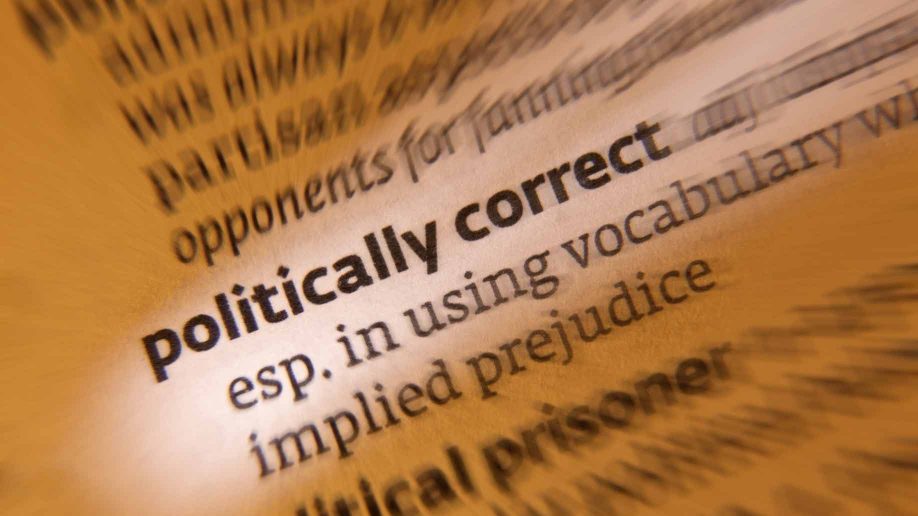
“Sticks and stones may break my bones, but words will never hurt me.” This old English rhyme is often heard during one’s childhood, typically as comfort to a victim of ridicule by other children. Implicit in the advice is the unspoken admonition to the child to grow up and ignore the pain of verbal abuse – after all, it’s only words.
Many believe that the avoidance of words that may offend, marginalize, or insult a group of people – political correctness (PC) – has gone too far. According to PC critics, PC promotes a society of victimhood and endangers the public at large by limiting discussion about controversial subjects. Chris Cox, the executive director of the NRA Institute for Legislative Action, wrote in a USA Today op-ed about the Orlando mass shootings that the “administration’s political correctness prevented anything from being done about it.”
Conservatives claim that PC is a threat to the first amendment and our right to free speech. Columnists liken modern-day America to Ray Bradbury’s “Fahrenheit 451” or George Orwell’s future society in “1984“. In “1984”, Big Brother’s thought police relentlessly pursue anyone foolish enough to say anything that might be offensive to someone. Surprisingly, liberals – often blamed for the expansion of PC – have their own misgivings about verbal censorship. Ralph Nader, a former third-party candidate for president, says, “You can’t say this about that, and you can’t say that about this. And the employer tells you to hush. And perhaps your wife tells you to hush, and your kids tell you to hush. It’s gotten absurd.”
Does one’s choice of words matter? Have efforts to avoid offense stifled free speech as many claim? Is political correctness an expression of politeness, evasion of hard truths, or extreme sensitivity? Or is an expression of anti-PC sentiment simply incivility, indecency, or vulgarity, as Mark Hanna writes in TIME?
Read more . . .
Understanding the Impact of a Federal Minimum Wage Increase

On February 11, 2014, President Barack Obama signed an executive order raising the minimum pay for workers employed by companies that have federal contracts. The pay per hour would be lifted from $7.25 to $10.10 and go into effect on January 1, 2015.
As might be expected, the move ignited a fire storm of dueling statistics and questionable conclusions from both sides of the political spectrum. Consequently, the average American is likely confused about who the order affects and its potential impact on the economy.
The Driver for Change: Income Inequality in America
The words “income inequality” presuppose that the current distribution of income between various levels of the population is unfair, a conclusion both supported and contested by many. The facts are that an increasing share of pre-tax cash market income – such as wages and salaries, dividends, interest, rent, investment returns, and business profits – has gone to the top 1% of Americans, while the share of the bottom 90% has fallen since the mid- to late-1970s. According to figures compiled by Emmanuel Saez, economics professor at UC-Berkely, the top 1% received around 22.5% of all pretax income while the bottom 90% dropped below a 50% share for the first time in history.
Whether or not this represents a problem depends upon your perspective and political leanings. According to a Pew Research Factank report from December 2013, 61% of Democrats and 50% of independents said the gap was a big problem – versus only 28% of Republicans.
In 2012, former partner at Bain Capital and author of “Unintended Consequences: Why Everything You’ve Been Told About the Economy is Wrong,” Edward Conard, aggressively argued that the enormous and growing income inequality was a sign that the U.S. economy was working, and, if we had a little more inequality, everyone – particularly the 99% – would be better off. According to the New York Times, Conard is not only a member of top 1%, he is a member of the top 0.1%, with an estimated wealth of hundreds of millions of dollars. Are Mr. Conard and his 1% cohorts just protecting their assets as their opponents claim, or do they have the solution for a better America?
On the other side of the issue, Nobel laureate economist Joseph E. Stiglitz claims in his book “The Price of Inequality” that rising inequality is putting a brake on growth and promoting economic instability. British epidemiologists Kate E. Pickett and Richard G. Wilkinson, writing in “The Spirit Level: Why More Equal Societies Almost Always Do Better,” go even further to claim that income inequality undermines social bonds, contributes to mental illness, and increases obesity and teenage pregnancy while fostering crime and lowering life expectancy. Conservatives claim such opinions are akin to Chicken Little’s hysteria that the sky is falling – but what if they’re right?
A third perspective on income inequality was presented in a 2013 Forbes article by Shah Gilani, a hedge fund manager and a former manager of the futures and options division of Lloyd’s Bank. Gilani proposes that the tax code should be revamped and simplified while improving educational opportunities and skill-based opportunities for the middle class. He argues that the middle class are the real victims of inequality, and if not helped they “will increasingly slip into poverty and the backbone of America’s increasingly brittle skeleton will turn to dust.”
4 Secrets of Investment Success – Tips to Gain Wealth

In the last half-century, the names of Ross Perot, Sam Walton, Bill Gates, and Warren Buffett have appeared at the top of the lists of wealthiest Americans, all of whom have been the subject of biographies chronicling their rise to the pinnacle of riches. A reading of those life histories provides no evidence of membership in secret societies, no teachers or advisers who may have passed along confidential knowledge about savings or investments, no super-human skills, and no extraordinary abilities or qualities beyond intelligence and a strong work ethic.
If there are no secrets to wealth-building, what do successful wealth-builders have in common? What personal attributes are equally valuable in industries as diverse as retailing, software development, and investing? Are these identifiable common traits, in fact, the secrets to their success?

